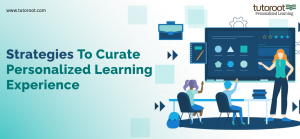Strategies and Examples to Curate Your Own Personalized Learning Experience
What is Personalized Learning?
We are all distinct in terms of looks, culture, and philosophies. These distinctions do not end here. They are also present in terms of learning, and because each student has distinct talents, we cannot compare two of them based on their grasping or learning abilities. As no two students learn at the same pace, there is an intense need for personalized learning.
Let us understand what personalized learning entails. In a word, personalized learning means developing an educational environment and curriculum that are tailored to each student’s specific needs and abilities. Depending on your learning pace and interests, you may create your own personalized learning experience. In this blog, we will discuss personalized learning and its strategies, as well as some examples.
Personalized Learning Strategies and Examples
What is Personalized Learning Strategies?
The student-centered approach to learning is becoming increasingly popular, as personalized strategies allow for a more personalized experience. This combination of education and technology (ed-tech) has already created many options for young people to expand their talents and boost their lifetime learning capabilities, particularly for students in school and college or simply those who take online courses.

Learning has become more personalized and tailored to each individual’s needs, strengths, and interests. Here are some approaches to applying a personalized experience in your own practice.
Choices Based Learning
Allowing students to choose how they approach a task or complete an assignment is a great way for them to practice personal responsibility, time management, and independent thinking.
One example would be to provide a daily activity list and allow students to determine the order in which the tasks are accomplished. Another example is starting class with a round-table discussion that invites students to explain what they want to learn the most from the day’s or week’s agenda.
Inquiry-Based Learning
Nothing beats designing challenges that force learners to embark on fascinating knowledge journeys and develop actual answers to real issues. In that way, inquiry-based learning was designed for customization. This is because it actively engages students in the discovery phase of learning by placing responsibility for learning directly in their hands.
Rather than simply telling students what they need to know and asking them to repeat it, the inquiry-based learning approach takes advantage of a learner’s natural curiosity. It encourages kids to investigate information in their own unique way by asking well-crafted questions and sharing thoughts and perspectives. In that sense, inquiry-based learning works best in group settings when cooperation allows for the accumulation of information via vibrant and meaningful conversation.
Use Express Evaluation
If there could only be one evaluation approach to use when dealing with modern learners, a formative assessment would be the winner.
Formative assessment is an evaluation of learning that may be provided to students in a variety of methods throughout the learning process. Simple methods such as formative feedback, discussion threads, peer-led quizzes, exit tickets, think-pair-share activities, opinion charts, and others can be used.
Any tests should be goal-oriented, actionable, and focused on strengthening higher-order thinking abilities. Choose one or two easy formative assessment tools to use and closely watch the outcomes. Allow your students to utilize these ways to assess themselves and their peers, which is an excellent way to delegate learning responsibility to them.
Make Use of Personalized Learning Playlists
A learning “playlist” is a collection of connected learning exercises. Students can select their own tasks and finish them at their own leisure. Students can demonstrate their effort by earning a minimum number of points by awarding points to each task.
A playlist’s activities can take many different forms, including:
- Writing work
- Educational games
- Discussion threads
- Opinion charts
- Quizzes
Bring Out Their Knowledge
Our students, like ourselves, are complicated and one-of-a-kind individuals. They provide the opportunity for relevant personal learning connections to every class or subject every day. So why not approach them? There might be a variety of methods for people to offer unique insights to any debate that will make the information more valuable to them and others.
Assume you’re teaching Design and Technology, and the topic of how rapidly our technology becomes obsolete comes up. Our technology may appear out of date (or out of vogue) soon after we obtain it. Encourage them to publicly share their views and fling them around the room for debate.
Allow Students to Teach
It may appear strange, but it works, and students enjoy it. This is a fantastic continuing formative assessment technique for measuring comprehension, in addition to creating key communication, leadership, and instructional abilities.
If a learner can teach the information to others in such a way that others not only understand it but profit from it, the student has mastered it. Allowing your natural teachers to reinforce concepts in themselves and others by teaching them may be a motivating moment in any classroom.
Final Notes
Every kid learns at his or her own pace. Each has certain needs and interests that are unique to their learning style. Personalized learning helps individuals study at their own pace and in the most useful way. Furthermore, it aids children’s future ambitions by providing them with the finest attainable chances. Your children need a personalized mentor to look up to, especially when it comes to their studies. At Tutoroot, we provide personalized mentors who can help your children learn in the way they want. Sign up today to get started.
